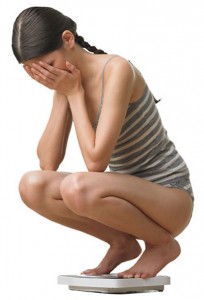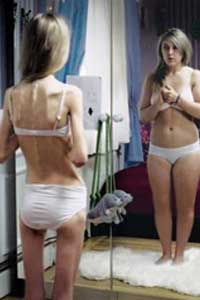Eating disorder is typically a term we throw around when referring to young girls or teens struggling with their weight and body image and resort to abusing food to solve the problem. But few people consider that eating disorders can affect more than just 18-year-old girls; they can affect middle-aged women, too.
A new study from the University of Carolina School of Medicine found that many women over the age of 50 struggle with the same issues as females half their age when it comes to body image and diet.
Researchers surveyed nearly 1,850 women concerning their diet and behavioral patterns in order to get a better idea of current and past eating disorder symptoms, body image struggles, and weight concerns in women 50 and older. With the study, researchers were hoping to better understand whether eating disorder symptoms in the past were associated with disordered eating behaviors and attitudes later in life.
The participants were given an online survey that required them to provide information about their race and ethnicity, age, height, weight, and BMI. They were then asked a series of questions that gauged their current and past struggles concerning diet, weight, BMI, and binge eating, among others. They were also asked how many times a week they looked in the mirror and closely examined their bodies, pinched fat, etc.
 Researchers found that eating disorder symptoms, dieting and body scrutinizing behaviors, and weight and body shape concerns were “widely endorsed” among their participants. And that younger age and higher BMI were associated with a greater risk of eating disorder symptoms, behaviors and concerns.
Researchers found that eating disorder symptoms, dieting and body scrutinizing behaviors, and weight and body shape concerns were “widely endorsed” among their participants. And that younger age and higher BMI were associated with a greater risk of eating disorder symptoms, behaviors and concerns.
They also found that two-thirds of the women surveyed were unhappy with their overall appearance, more than 70 percent were trying to lose weight, and a small amount even admitted to purging and binge eating within the last year.
While there can be multiple explanations for these findings, lead researcher and director of the UNC Eating Disorders Program, Cynthia Bulk, told NPR that it may be the pressure in our culture for older women to retain their youthful appearance.
“I think part of this is that our society has made it not OK to age. Many industries have put enormous pressure on women to continue to look young…” she said. “So I think part of this is a nasty side effect of what I call the ’70 is the new 50′ movement. Women are feeling like they need to go to extreme measures to continue to look thin and attractive and young.”
In light of these findings, the message that Bulk wants to send to women who may be struggling with their weight and body image is this: Look in the mirror every day and say something positive about your physical appearance, because it will make all the difference in battling negative body image.
These findings are eye opening and make it clear that eating disorders and body image struggles aren’t just a problem for young girls, but for older women as well. And while it’s easy to think we can accept the changes that come with age, it may be more difficult to actually do than we realize.
I love Cynthia’s advice to focus on the positive rather than the negative, because focusing on your flaws will never get you anywhere but down. And people hardly notice the ‘flaws’ we see anyways. It’s also comforting to realize that there are practical measures we can take to help our bodies age more gracefully, because there really is a unique beauty and wisdom that comes with age that I personally can’t wait to attain.
Also Read:
Common Eating Disorders Defined
How a Nude Photo Series Affected One Woman’s View on Body Image
The Binge Eating and Compulsive Overeating Workbook
